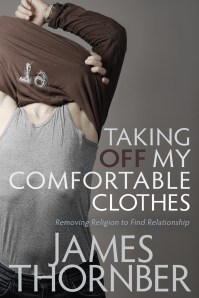The following is an excerpt from my book Taking Off My Comfortable Clothes, which is available now. The book recounts my thoughts during the four years I was an Assemblies of God minister and a monk with the Brothers and Sisters of Charity.
 A few years ago, my wife and I visited a church to determine if I wanted to become their new pastor. We drove to the church early on that warm, October morning, full of hope and expectation. When we walked into the small fellowship hall, it was obvious we were the visiting pastors, for new, younger faces are easy to spot in this small, elderly congregation. As we passed through the fellowship hall on our way to the sanctuary, one lady gave us a short glance, quickly scanned Barbara up and down, and walked by us without saying a word. Little did we know we had just committed a cardinal sin in this small church: we were not appropriately attired.
A few years ago, my wife and I visited a church to determine if I wanted to become their new pastor. We drove to the church early on that warm, October morning, full of hope and expectation. When we walked into the small fellowship hall, it was obvious we were the visiting pastors, for new, younger faces are easy to spot in this small, elderly congregation. As we passed through the fellowship hall on our way to the sanctuary, one lady gave us a short glance, quickly scanned Barbara up and down, and walked by us without saying a word. Little did we know we had just committed a cardinal sin in this small church: we were not appropriately attired.
We didn’t mean to be under dressed; it just happened. Yes, we were fully covered, but not in their eyes. You see, my wife made the horrible mistake of wearing a pretty black dress that did not fully cover her knees. That didn’t bother me — I kinda like her knees. But it obviously bothered this woman. A lot. Furthermore, I chose to wear a suit and a silk pullover shirt but no tie. Strike two. The odds were stacked against us and we hadn’t even introduced ourselves. It was going to be a long day.
When I look back on it, I see that Barbara and I had a different definition of holiness than the saints of this small congregation. Without knowing our hearts, some pre-judged us as Christians based on nothing more than what we were wearing.
But I also encountered this same attitude when I wore my habit. If I were in a Catholic church, I found people granted me a certain amount of respect and consideration, but when I traveled among people of my own congregation, I encountered suspicion, prejudice, and hushed whispers. I suppose this is only right, for we all tend to fear or ignore those things we don’t understand. And I admit that I was a challenge to people in the Assemblies of God who couldn’t put me into a neatly defined category. Heck, I couldn’t even put myself into a neatly defined category!
In some ways, we are all guilty of prejudice (from the Latin praejūdicium, meaning prejudgment) regarding people who do not dress as we deem appropriate. And yes, some dress is inappropriate and socially unacceptable. A bathing suit is appropriate for the beach, but not for a visit to the White House.
However, as Christians, you would think that after receiving the full pardon and forgiveness of God in spite of how we still look, act, think and dress, we could grant that same pardon and acceptance to those we meet in church. Alas, such is not always the case. After being redeemed from the law, the Church has stacked law upon law in the name of holiness and marked distinct lines on the floor of the sanctuary that tells everyone who comes in, “You are holy and acceptable in our eyes if you are on this side of the line, but if you step over it, I will give you a quick glance up and down and walk by without saying a word.” And here I thought Paul was trying to teach us something different when he wrote, “For the kingdom of God is not a matter of eating and drinking, but of righteousness, peace and joy in the Holy Spirit” (Rom. 14:17).
So what does the above diatribe have to do with me? By dressing in the distinct garment of a monk, it was easy to convince myself that God may love and accept me just a tad more than the average church-going Christian because of the obvious sacrifices I made for the Kingdom. Wearing the monastic habit became a symbol of my sacrifice, a badge of honor that said, at least in my mind, “Look at me and know that I have gone the extra mile for the Kingdom.”
Naturally, as soon as I began to think this way, I moved from walking in the grace of God’s forgiveness into a state of self-justifying works that helped nobody. I rant against the clothesline theology of the woman who ignored us in church because I first had to rant against myself for committing the same sin. Holiness is not a matter of what we eat, drink or wear, but a result of our faith in a God who desires to make us Christ-like in every aspect of our lives.


